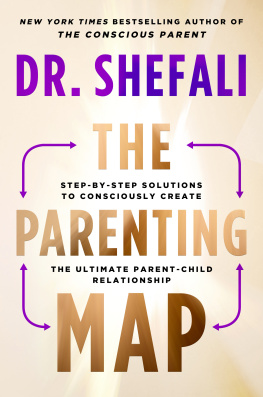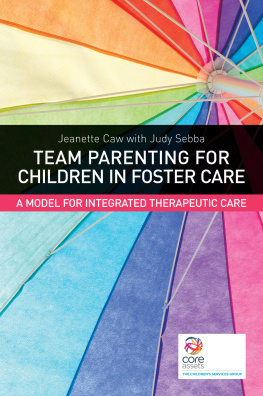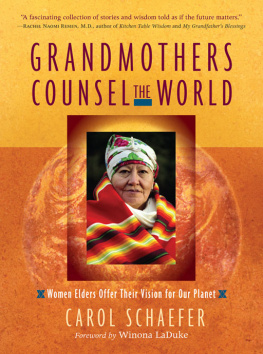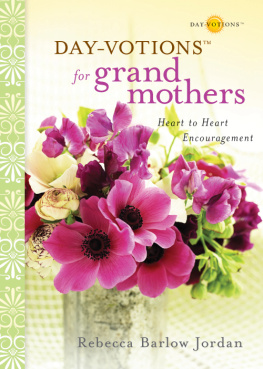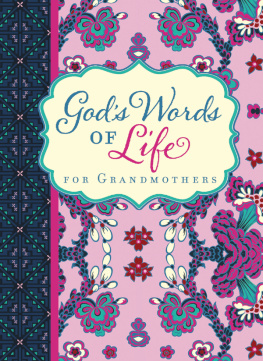Originally published in 2000 by the Hera Trust, London
Published 2002 by Transaction Publishers
Published 2017 by Routledge
Park Square, Milton Park, Abingdon, Oxon OX14 4RN
711 Third Avenue, New York, NY 10017, USA
Routledge is an imprint of the Taylor & Francis Group, an informa business
Copyright 2002 by Taylor & Francis
All rights reserved. No part of this book may be reprinted or reproduced or utilised in any form or by any electronic, mechanical, or other means, now known or hereafter invented, including photocopying and recording, or in any information storage or retrieval system, without permission in writing from the publishers.
Notice:
Product or corporate names may be trademarks or registered trademarks, and are used only for identification and explanation without intent to infringe.
Library of Congress Catalog Number: 2001041587
Library of Congress Cataloging-in-Publication Data
Grandmothers: the changing culture/ Geoff Dench, editor.
p.cm.
Includes bibliographical references and index.
ISBN: 0-7658-0893-5 (pbk.: alk. paper)
1. Grandmothers-Great Britain. I. Dench, Geoff.
HQ759.9 .G7155 2001
06.8745-dc21
2001041587
ISBN 13: 978-0-7658-0893-6 (pbk)
Geoff Dench
This book brings together a collection of personal reflections on what it means to be a grandmother in contemporary society, and views on how the role may be evolving.
We can safely assume from the outset that it will have changed a good deal in living memory, because family life in general has gone through radical transformations. Two sets of factors have been particularly important here. Firstly, developments in medical technology have helped to increase control over reproduction, so having a family can more easily be timed and scaled to fit in with other activities. Secondly, the growth of citizenship, as manifest in the multiplication of state supports, has meant that being a parent no longer need entail such dependence as before on relatives, friends and neighbours. Basic social security has become separated from community ties and obligations. Over the last third of a century these two major influences have combined to give people a larger choice of lifestyles, and thereby to encourage experimentation with new forms of household and family relationship.
Most commentaries on the ensuing lifestyle revolution have not touched on grandparents. But over the last few years there has been a surge of interest in grandparenting - prompted mainly by concern over the possible effects on children of new styles of parenting - and in the part that grandparents might play or be playing as saviours of family life.
In response to these concerns, the Institute of Community Studies and National Centre for Social Research carried out a survey to get some idea of the current role played by grandparents in British society. This has given us a solid general picture of how the role is now acted out, plus some fascinating hints about how it may be changing. However one survey, conducted over one short period, cannot really tell us much about trends. To get more insight into questions of how the role is adapting to new family behaviour it seemed essential to ask people who have been grandparents through the lifestyle revolution to make some personal assessments.
The accounts which follow here will help to give our research the historical dimension it lacks. This will go beyond clarifying the part played by grandparents. It also involves providing commentaries on the wider transformation of family and sexual behaviour. No realistic assessment of a radical change in lifestyles can be started until it has been tested in all stages of life. Young people are usually more willing to adopt novel ideas, especially those which challenge authority structures and give short-cuts to independence. But until new ideas have been adapted to the needs of other age-groups too, and can be seen to allow co-operation between generations, they cannot be regarded as viable. Only as the cohort leading the revolution itself moves through the life-cycle does it become possible to see which of its practices are ephemeral and age-specific, and which are more general and sustainable.
We are arriving at this defining stage now for the libertarian revolution which was launched in the sixties. The wartime and postwar babyboom cohorts have started to become grandparents and take on senior family positions. So we can now begin to see how far they will continue innovating and casting aside tradition, and how far the logic of their new roles may lead them back towards rediscovery and reassertion of traditional ways. It is an important moment of truth.
But why grandmothers?
The Rousing of Mothernature
This opportunity for appraisal of social revolution coincides very handily with the rise of exciting new intellectual models, offering additional dimensions of analysis. The new discipline of Evolutionary Psychology, springing from the work of the late William Hamilton, has seriously challenged the traditional dichotomy between culture (society) and nature. This inevitably changes the way that we look at the sixties revolution. That was based on assertion of the power of human thought to transcend material factors, and to freely invent new futures. But as the wheel of revolution turns it is these new materialist theories which seem to offer the neater explanations of how society works. In particular, they are producing very stimulating insights into the part that women, and female nature, may have played in the formation of society.
One of the key debates here revolves, aptly enough, around the grandmother hypothesis. This debate springs out of scholarly efforts to understand the menopause. Human beings are one of the very few species where female fertility does not continue up to the end, or near the end, of the normal lifespan. Elephants and whales share this. Excellent company!
The existence of the menopause is almost certainly linked with the importance of long-term mothering in species where the young are dependent for a long period. Mothers who have children late in life cannot hope to rear them all, and may die even younger themselves in the attempt. However, menopause may also, perhaps even more revealingly, be related to grandmothering - and an



